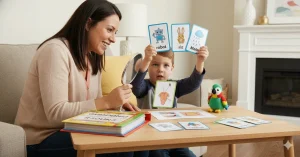10 Questions to Ask During Your Child’s Autism Screening
Last Updated: September 26, 2024
Early autism diagnosis is crucial for a child’s development. Recognizing unusual behaviors can lead to questions about autism and the need for support. Autism screening plays a vital role in identifying potential signs of autism spectrum disorder . By asking the right questions and understanding the screening process, parents can be better equipped to advocate for their child’s needs and access appropriate resources. Early intervention can significantly impact a child’s communication, learning, and social skills.
Discover your child’s developmental needs with our Autism Screening Tests
Understanding Autism Screening
What is Autism Screening and Why is It Important?
Autism screening is a process designed to identify signs of autism spectrum disorder (ASD) in children at an early stage. Typically conducted by pediatricians or specialists, these screenings are not definitive diagnoses but serve as a way to detect early behavioral patterns that may indicate autism. The purpose is simple: early detection can lead to early intervention. By identifying signs of autism as soon as possible, parents and caregivers can access support, resources, and therapy that can significantly improve a child’s development and quality of life.
Parents often wonder, “Why is early autism screening so crucial?” Simply put, the earlier a child receives support, the better their chance for developmental progress. Early interventions can help improve social skills, communication, and behavior—key areas where children with autism often need support.
Also read: The Role of Autism Screening Tests in Early Childhood Intervention
What to Expect in an Autism Screening
When preparing for an autism screening, it helps to know what to expect. Understanding the process will not only ease your mind but also help you prepare your child. Generally, an autism screening includes the following steps:
- Initial Questionnaire and Parent Interview
You’ll usually start by filling out a questionnaire that asks about your child’s behavior, social interactions, and development. Expect questions about your child’s communication skills, play habits, and response to their environment. This helps the specialist get an initial sense of any developmental concerns. Following the questionnaire, there may be a short interview where you discuss your child’s milestones and daily habits in more detail. - Observational Assessment During this part of the screening, a specialist will observe your child in a play-based setting. This could involve simple activities such as stacking blocks, playing with toys, or engaging in pretend play. The focus here is to watch how your child communicates, interacts, and behaves. The specialist may look for signs like eye contact, response to their name, use of gestures, and overall social engagement.
- Discussion of Findings and Next Steps At the end of the screening, the specialist will discuss their findings with you. If they see signs that suggest autism, they might recommend further evaluation by a developmental pediatrician, psychologist, or speech-language therapist. Remember, an autism screening is a preliminary step, and a full diagnosis requires a more comprehensive evaluation.
10 Essential Questions to Ask During Autism Screening
During your child’s autism screening, it’s important to know what to ask to gain clarity and understand your child’s needs. Here are 10 essential questions that can guide you through the screening process:
1. What Signs of Autism Are You Observing in My Child?
Understanding why the specialist suspects autism is crucial. Autism spectrum disorder (ASD) presents differently in every child, with some showing communication delays and others demonstrating social challenges or repetitive behaviors.
Purpose: This question helps you understand the specific behaviors or developmental milestones that led to the screening. Knowing which traits your child is exhibiting will give you insight into the next steps and why early intervention is important.
Common Red Flags of Autism in Early Development
| Developmental Area | Signs to Look Out For | Typical Age of Onset | What It Could Mean |
|---|---|---|---|
| Social Interactions | – Lack of eye contact – Doesn’t respond to name when called – Limited or absent social smile | By 6 months By 12 months By 6-9 months | Difficulty in social bonding or connecting with others Challenges in developing social communication Potential struggles with social engagement |
| Communication & Speech | – Delayed speech or no babbling – Rarely gestures (e.g., pointing, waving) – Repeats words/phrases without context (echolalia) | By 12 months (babbling), 24 months (speech) By 9-12 months By 24 months | Language development delay Difficulty using non-verbal cues for communication Repetitive speech without meaningful use |
| Behavior & Play | – Repetitive movements (e.g., hand-flapping, rocking) – Prefers solo play over interactive play with peers – Has intense focus on specific interests or routines | Can appear anytime in early years By 2-3 years By 24 months and older | Repetitive behaviors as a form of self-regulation Difficulty forming relationships or playing cooperatively Rigid adherence to routines, potential distress with change |
| Sensory Sensitivities | – Over or under-sensitive to sensory input (e.g., loud noises, textures) | Can appear in infancy or early years | Sensory processing challenges, unusual reactions to stimuli |
2. How Is This Screening Conducted, and What Should I Expect?
Autism screenings can vary in their approach—some may involve observation, while others may include interactive play-based assessments. Knowing what the process entails can help ease anxiety for both you and your child.
Purpose: Asking how the screening will be conducted helps you prepare for what’s to come. It provides peace of mind by helping you understand the screening’s structure, allowing you to better support your child through the process.
3. How Accurate Are the Screening Results?
Screenings are helpful tools but are not definitive. They give a probability rather than a concrete diagnosis. Understanding the accuracy and any limitations of the screening tool used is important.
Purpose: This helps set realistic expectations. It allows you to understand that further testing might be necessary and prepares you for possible next steps if your child screens positive for autism.
4. What Further Evaluations Might Be Needed if My Child Screens Positive?
If your child shows signs that may indicate autism, it’s natural to wonder what comes next. Autism screening is usually the first step, often followed by more detailed evaluations to confirm a diagnosis.
Purpose: Knowing the potential need for further evaluations, such as developmental assessments or speech and language tests, can help you plan and schedule these steps without delay. This awareness keeps you ahead in finding the best care for your child.
5. How Will the Screening Results Be Shared with Me?
Timely and clear communication is key when it comes to autism screening results. It’s important to understand how you’ll receive the results and what kind of follow-up discussions will be held to discuss the findings.
Purpose: By knowing how the results will be shared (in-person meeting, written report, or both), you can plan for follow-up questions and ensure you fully understand the screening outcomes.
6. What Should I Do While Waiting for a Diagnosis?
Waiting for a diagnosis can be a challenging time. Knowing how to support your child during this waiting period is valuable. This could involve incorporating speech activities, promoting social interactions, or starting early intervention therapies.
Purpose: This question empowers you to take proactive steps. While awaiting a formal diagnosis, there are often small changes you can make or activities you can introduce that can benefit your child’s development and help you feel more in control.
7. If Diagnosed, What Are the Early Intervention Options?
Early intervention plays a crucial role in a child’s development, especially if they’re on the autism spectrum. Understanding the available therapies, such as speech therapy, occupational therapy, and behavioral interventions, is key to supporting your child.
Purpose: Knowing your options enables you to seek the right support for your child immediately. Early intervention has proven benefits for children with autism, helping them improve social, communication, and daily living skills.
8. What Can I Do at Home to Support My Child’s Development?
Parents play a fundamental role in their child’s development, especially when they have autism. Simple home activities like sensory play, routine-building, and encouraging social play can make a big difference.
Purpose: Asking this question allows you to contribute to your child’s progress actively. You’ll receive guidance on activities that you can do as part of daily life, making home a supportive environment for your child’s growth.
9. What Resources Are Available for Support (Local & Online)?
Navigating an autism diagnosis often requires support from professionals and the community. Many parents find resources like support groups, specialist recommendations, and educational materials invaluable as they adapt to their child’s needs.
Purpose: Knowing about resources available to you—whether through local communities or platforms like Wellness Hub—helps you build a network of support. This can provide emotional guidance, practical tips, and help you connect with others who share similar experiences.
10. What Are the Next Steps After the Screening?
It’s essential to know what to do after the screening is complete. Whether it’s setting up a follow-up appointment, meeting with a specialist, or initiating early intervention, having a plan will help you feel more prepared.
Conclusion
Going through an autism screening can feel overwhelming, but it’s an essential step in understanding and supporting your child’s development. The process provides clarity about your child’s needs and helps you find the right support and resources. Whether the screening indicates autism or suggests more evaluations, it’s all about getting the best guidance for your child to help them thrive. Remember, being prepared, asking questions, and staying informed are important parts of advocating for your child.
At Wellness Hub, we’re here to support you every step of the way. Our goal is to provide families with resources, expert guidance, and a sense of community. If you have questions or need help with early intervention, therapies, or finding information on autism, our website offers a range of support tailored to your needs. You’re not alone on this journey—let’s work together to help your child reach their full potential.
Frequently Asked Questions:
1. What is an autism screening, and why is it important?
An autism screening is a process that helps identify early signs of autism in children. It’s important because early detection can lead to early intervention, which is crucial for improving communication, social skills, and overall development in children on the autism spectrum.
2. What questions should I ask during my child’s autism screening?
Some essential questions include asking what signs of autism the specialist is observing, how the screening is conducted, the accuracy of the results, and what next steps to take if your child screens positive. These questions help you understand the process and support your child effectively.
3. How do I prepare my child for an autism screening?
You can help your child get ready for the screening by explaining what will happen in simple words. Tell them they will meet someone who wants to play and learn about them. Bringing a favorite toy or blanket can help them feel more comfortable.
4. What should I expect during an autism screening?
During an autism screening, you’ll likely fill out a questionnaire about your child’s behavior and development. The specialist may also observe your child’s behavior through play-based activities and use standardized tools to assess developmental milestones.
5. How can I prepare for my child’s autism screening?
Preparation includes gathering your child’s medical records, noting down any concerning behaviors, and writing down questions for the specialist. Preparing your child for the appointment by explaining it in simple terms can also help make the process smoother.
6. What happens if my child screens positive for autism?
If your child screens positive, further evaluations might be recommended by specialists such as developmental pediatricians, psychologists, or speech-language therapists. These evaluations are more in-depth to confirm whether your child is on the autism spectrum.
7. What therapies are suggested if my child has autism?
Therapies vary based on your child’s needs but often include:
- Social Skills Training: To support making friends and interacting with others.
- Speech Therapy: To help with talking and communication.
- Occupational Therapy: For daily activities and motor skills.
- Behavioral Therapy (e.g., ABA): To improve behaviors and social skills.
8. What activities can I do at home to support my child?
Try simple activities to help your child’s development, like:
- Interactive Games: Turn-taking games like “Peek-a-Boo” or building blocks.
- Speech Games: Playing “I Spy” or telling stories.
- Routine Activities: Creating regular daily routines.
- Routine Activities: Creating regular daily routines.
9. How soon will I receive the results after the autism screening?
The timeline for receiving results can vary based on the specialist or healthcare provider. Some may share results on the same day, while others may need additional time to analyze and provide a detailed report. Make sure to ask how and when you will receive the results.
10. Are there resources available for parents who suspect their child has autism?
Yes, there are many local and online resources, support groups, and therapy services available for parents. Wellness Hub offers a range of information, resources, and professional guidance to help parents navigate autism screenings and interventions effectively.
About the Author:
Anuradha Karanam
Speech-language pathologist (7+ years of experience)
Anuradha Karanam is a skilled speech-language pathologist with over 6 years of experience. Fluent in Tamil, Telugu, Hindi, and English, she specializes in parent counseling, speech sound disorders, fluency assessment, and speech-language evaluations. Anuradha excels at working with children with developmental disorders, offering creative and effective therapy programs. Currently, at Wellness Hub, she holds a BASLP degree and is registered with the RCI (CRR No A85500). Her patience, ambition, and dedication make her a trusted expert in her field.
Book your Free Consultation Today
Parent/Caregiver Info:
Client’s Details:
* Error Message









